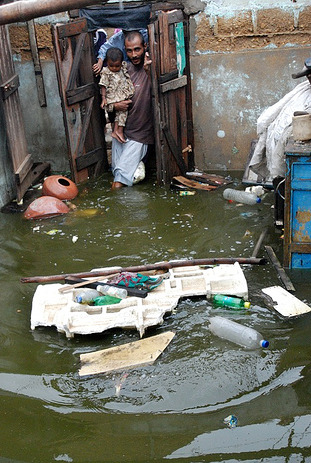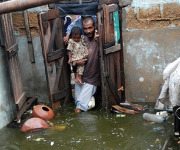 Floods, like those in Pakistan this year, and other effects of a 7 degree temperature rise could cause up to a billion people to relocate.Photo: nb77Nothing but low expectations out there about the U.N. climate conference in Cancun. But a new study released today reminds everyone gathering in Mexico how much is at stake.
Floods, like those in Pakistan this year, and other effects of a 7 degree temperature rise could cause up to a billion people to relocate.Photo: nb77Nothing but low expectations out there about the U.N. climate conference in Cancun. But a new study released today reminds everyone gathering in Mexico how much is at stake.
Cast the worst stone: The research by British scientists concludes that if the Earth’s temperature rises by 7 degrees Fahrenheit the rest of this century — and some researchers think that could happen as soon as 2060 — up to a billion people would have to be relocated. And another 3 billion could end up without access to water supplies. The new reports also carry the grim message that unless countries drastically reduce their greenhouse gas emissions within the next few decades, the planet’s likely to reach a point of no return. As climate scientist Peter Stott told The Observer:
… the amount of carbon dioxide that can be absorbed decreases as temperatures rise. We will reach a tipping point from which temperatures will go up even faster. The world will then start to look very different.
Time for a little gas picking: Given the slim chance that major progress will be made in Cancun to cut carbon dioxide emissions, some think it makes more sense, for now at least, to focus on other pollutants that are easier to control, such as methane, hydrofluorocarbons, and soot. Writing in The New York Times, scientists Veerabhadran Ramanathan and David Victor make the point that small victories are needed, even if their benefits are more short-term:
Reducing soot and the other short-lived pollutants would not stop global warming, but it would buy time, perhaps a few decades, for the world to put in place more costly efforts to regulate carbon dioxide. And it would help the major economies demonstrate credibility on climate change, which has been in short supply in the diplomatic talks so far.
And in other green news:
Bottom’s up: The U.S. would be better off dealing with climate change from the bottom up — from the states — rather than banking on anything meaningful coming out of Washington. So argues Bruce Usher, former head of the EcoSecurities Group:
The United States still has a very long way to go to curtail emissions, but the states are heading in the right direction, and national energy policy must build on their efforts. Congress should extend federal financing, tax credits and loan guarantees for renewable energy projects and for upgrading transmission lines. It should also develop clear environmental standards for extracting natural gas from shale. [The New York Times]
Feel like Chinese food?: Yet another representative issues a “China’s going to eat our lunch” warning. First it was outgoing Republican Bob Inglis of South Carolina. Now it’s Democrat Jay Inslee of Washington, who tossed out a China-lunch reference while defending his opposition to drilling for oil in the Arctic National Wildlife Refuge. Here’s Inslee:
China right now is preparing to roll out electric cars, lithium ion batteries, solar cells, cellulosic ethanol. This is where the future of energy is. We’ve a finite resource in oil, just like we had a finite resource in whale oil, and we made a transition. And we have to really focus our national energies in a bipartisan way, I would hope, on finding our way to compete with China to really build new energy sources of the future. [The Hill]
Slick and tired: The Justice Department has to go to court to force Transocean, owner of the Deepwater Horizon oil rig that exploded in the Gulf, to turn over safety reports that the drilling company is sitting on. [Houston Chronicle]
Black comedy: Oh, and BP is making a feature-length film about its exploits in dealing with the massive oil spill it helped cause. Sadly, you won’t be able to see it at a theater near you; it’s primarily for an “internal audience” and is being described as “an archive of a momentous event in the company’s history.” [The New York Times]
They need their space: Wind farms of the future are only going to get bigger and bigger. But scientists say that if they’re going to be truly efficient, the turbines need to be farther apart. [Wind Daily]
The wild green yonder: NASA put up $6 million to push development of greener commercial airplanes. The goal is to have future aircraft burn 50 percent less fuel. [Los Angeles Times]
The farmer in the hell: A Minnesota farmer worries that the extreme weather brought by climate change may end up destroying farming in America’s Midwest. Farmer Jack Hedin writes:
Climate change, I believe, may eventually pose an existential threat to my way of life. A family farm like ours may simply not be able to adjust quickly enough to such unendingly volatile weather. We can’t charge enough for our crops in good years to cover losses in the ever-more-frequent bad ones. We can’t continue to move to better, drier ground. No new field drainage scheme will help us as atmospheric carbon concentrations edge up to 400 parts per million; hardware and technology alone can’t solve problems of this magnitude. [The New York Times]
Be a good sun: Israel has taken a big step toward fulfilling its commitment to solar energy. It’s the first country in the Middle East where an electric company has agreed to buy renewable energy. [AOL]
You’re looking a little green: Does the employee handling chemicals that go into the batteries powering hybrid cars qualify as a green worker? Is a secretary at a recycling plant greener than a secretary at a coal plant? A new study tries to define what being a green worker means. [Discovery News]



